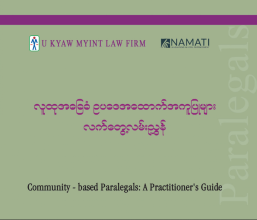Post
Burmese translation of paralegal practitioner’s guide launched in Rangoon
 On December 3, 2013, Namati and U Kyaw Myint Law Firm launched the Burmese language version of “Community-based Paralegals: A Practitioner’s Guide” in Rangoon, Burma. The event brought together over 60 representatives of NGOs, law firms, international organizations, donors, and the media. The practitioner’s guide, originally published in English by the Open Society Justice Initiative in 2010, draws from paralegal experience in several countries to provide practical advice to program designers and managers – advice now accessible to the growing number of legal empowerment practitioners in Burma.
On December 3, 2013, Namati and U Kyaw Myint Law Firm launched the Burmese language version of “Community-based Paralegals: A Practitioner’s Guide” in Rangoon, Burma. The event brought together over 60 representatives of NGOs, law firms, international organizations, donors, and the media. The practitioner’s guide, originally published in English by the Open Society Justice Initiative in 2010, draws from paralegal experience in several countries to provide practical advice to program designers and managers – advice now accessible to the growing number of legal empowerment practitioners in Burma.
After a representative of U Kyaw Myint Law Firm, Mandalay branch, officially welcomed the event participants, Advocate U Kyaw Myint introduced the concept of community-based paralegals. U Kyaw Myint told the story of his own exposure to the paralegal approach through the Southeast Asia Legal Aid Network and other regional training events. He continued with remarks about the need for supporting more systematic training and supervision of community-based paralegals, an increasingly prevalent model of justice service delivery in Burma.
“In this time of transition, there is new space for people to exercise their rights and hold institutions accountable. Even small remedies that people can obtain through paralegal assistance may begin to restore people’s belief in the power and relevance of the law.”
Laura Goodwin then shared a global perspective of community-based paralegal efforts, highlighting examples of the models – and impacts – of community-based paralegal efforts around the globe. She linked international experience to the Burmese context saying, “When people cannot easily access legal assistance and may not even see the law as a positive or valuable tool, there is a tremendous opportunity for paralegals to educate and empower individuals and communities. In this time of transition, there is new space for people to exercise their rights and hold institutions accountable. Even small remedies that people can obtain through paralegal assistance may begin to restore people’s belief in the power and relevance of the law.”
Following these remarks, Tin Moe Zaw, a paralegal in the Yangon Justice Center, shared some of her experience since beginning work early last year. Bridging the gap between indigent clients and lawyers at the Center, Tin Moe Zaw has supported Yangon residents seeking justice for housing and domestic issues.
The event marked the start of distribution of the Burmese language guide, now available in print or online to legal empowerment practitioners and others interested in the design and implementation of community-based paralegal programs. The publication, a collaborative effort by Namati and U Kyaw Myint Law Firm, was made possible with the permission and support of the Open Society Foundations.
- Read the Burmese language version of “Community-based Paralegals: A Practitioner’s Guide” on the tools database.
- The original English language publication is also available online in the Namati tools database.
- Read Eleven Media’s coverage of the event in Burmese here.
